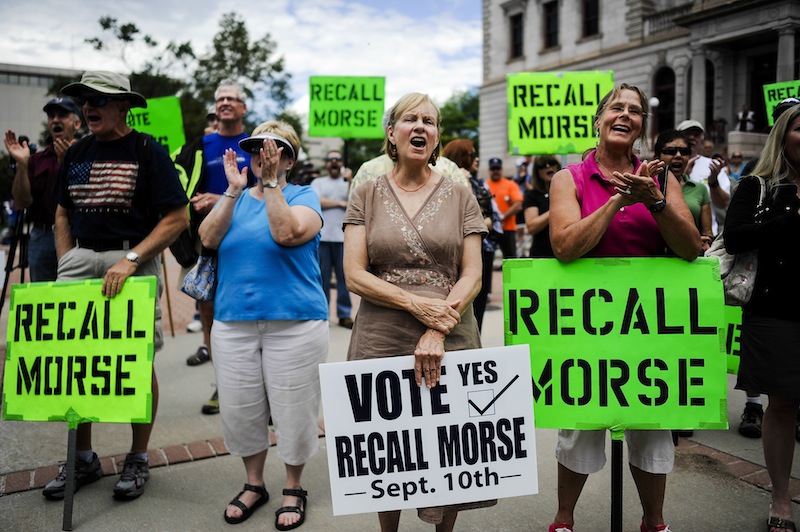If pro-gun activists are successful Tuesday in recalling Colorado’s Senate president and another Democratic senator, it could have an unintended consequence for the right: the state’s Senate leadership may move to the left.
Senate President John Morse (D) and Sen. Angela Giron (D) are both up for recall after helping to narrowly pass a bill that expanded background checks on gun purchases and limited the size of ammunition magazines.
The recalls have largely been framed as a test for which side has the upper hand nationally on gun control. Outside groups, that either support or oppose tighter gun restrictions have poured millions of dollars into Colorado to try to tilt the fates of the two state politicians. That includes the nation’s most prominent gun lobby, the National Rifle Association, which has spent a six-figure sum in the state, according to the Denver Post.
While it would mark a serious national victory for pro-gun advocates if one or both of the lawmakers went down, the situation inside the state capitol would be more complicated.
Democrats would still hold the majority in the Senate, even though it would be a much slimmer one, but they would retain enough votes to pick the chamber’s next president. People who are involved in Colorado politics told TPM last week that the most likely replacement for Morse is Sen. Morgan Carroll (D), currently the majority leader.
Carroll is said to be to the left of Morse, and she’s a big champion of gun control. Her district includes the Aurora movie theater where 12 people were killed and dozens more wounded in a mass shooting last summer. Following the December killings of 20 children and six adults at an elementary school in Newtown, Conn., she helped lead this year’s successful push to tighten the gun laws in Colorado.
But even if Democrats wind up with a more liberal Senate president, they would be faced with the problem of hanging on to a narrower majority if both Morse and Giron end up being recalled. The challengers for both seats are Republicans, and the split would become 18-17 rather than 20-15.
“It does mean the Democrats could hold a much more tenuous hold on the Senate,” University of Denver political science professor Seth Masket told TPM on Friday.
The way the recalls are set up, voters in each district will be faced with two questions on the ballot. The first will be whether to recall the district’s senator. The next will be who should replace the lawmaker if the recall is triggered. The only name on the ballot to replace Morse is former Colorado Springs city councilman Bernie Herpin (R), and the only name to replace Giron is conservative activist George Rivera (R). There is a space for a write-in candidate on both recall ballots, but it’s more likely that Herpin and Rivera would take Morse and Giron’s respective seats.
The GOP challengers clearly differ with the incumbents on gun control, but that has not been the only issue in the races. In fact, up close, they look more like a general election than most national media coverage would have one believe.
The contests have touched on marijuana use, energy, the Taxpayer Bill of Rights, and, unlikely, federal immigration reform. The fact that the Republican challengers are “strongly anti-abortion” even motivated Planned Parenthood to send 27,000 mailers out in support of the Democrats, according to The New Republic. Giron has spent some of her time on the campaign needling her challenger as anti-choice, according to The Pueblo Chieftain newspaper.
Yet even the starkest policy differences between the incumbents and their challengers pale in comparison to the prominence the recall election has gained. It’s been called a referendum on whether groups opposed to stricter gun laws can crack down on lawmakers that supported restrictions at any level of government.
“More generally, this is designed to have more of chilling effect on future gun control,” Masket said.
Masket should know. He helped produce a study, along with two California professors, that looked at the effect of a successful recall in the Golden State. It found that state lawmakers moderated their policy positions after the recall. The evidence suggested those lawmakers saw that recalls were possible and became more cautious to try and protect themselves from being recalled in the future. Masket said a recall in Colorado could have the same effect.
Beyond that though, there’s a fear that recall elections would become a normal part of the political cycle in Colorado.
“I think the biggest fear in all of this that we all have is that this is going to become the normal cycle. That in every off-year we’re going to have these recalls,” Ellen Dumm, a Democratic consultant in Colorado who is involved in staving off the recalls told TPM.
Dumm said Colorado Republicans haven’t had a “statewide majority in a long time” so if this recall went through, Republicans in the state might try to conduct another recall in the near future.
Republicans, of course, argue that not recalling Morse and Giron also has negative policy implications. Opponents of gun control see Morse and Giron as lawmakers that would go to great lengths to pass new gun laws. Therefore, advocates of the recall argue, Morse and Giron need to be removed from office quickly.
“They took a bill that came in from an out-of-state organization on gun control and they rammed it through without any debate, without any discussion, without any amendments from law enforcement,” Colorado Republican Party Chairman Ryan Call told The Washington Post.









